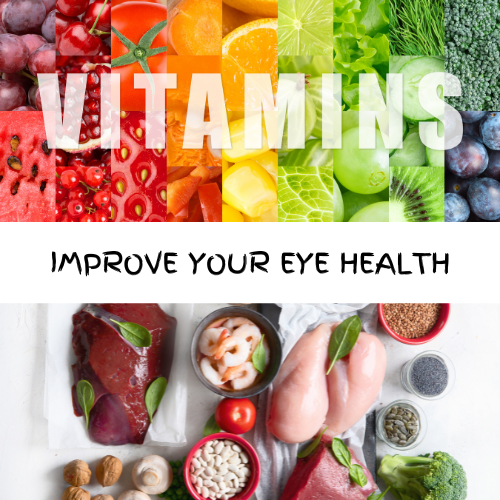What Vitamins Improve Eye Health?


What vitamins are good for your eyes?
Conditions such as nearsightedness, farsightedness, astigmatism, or presbyopia can only be treated with glasses, contact lenses, or refractive surgery.
But the health of the structures of your eyes—cornea, macula, retina, and optic nerve, may all benefit from a nutrient-rich diet full of vitamins, minerals, and antioxidants.
Antioxidants are molecules that neutralize unstable molecules (free radicals) that are created during the process of oxidation during normal metabolism. Free radicals may play a role in causing disease. When there is an imbalance between free radicals and antioxidants, oxidative stress occurs. Oxidative stress is responsible for many aging processes, including cataract formation.
The following are 8 important nutrients for the structures in the eye:
1. Vitamin A
Vitamin A enables the retina to make the pigments needed to see the full spectrum of light. Vitamin A also helps keep the cornea (the clear part of the eye) hydrated.
2. Beta carotene
This is a pigment from a family of compounds called carotenoids. These carotenoid pigments produce the bright yellow, red, and orange colors in plants, vegetables, and fruits and they act as an antioxidant. There are more than 600 different types of carotenoids. Some can be converted into vitamin A when released into the body.
3. Lutein
This is one of the two carotenoids found in the macula and retina.
4. Zeaxanthin
This is the other carotenoid found in the macula and retina.
5. Vitamin C
Vitamin C is essential for the production of collagen and the eye is composed of layers of connective tissue maintained by collagen.
6. Vitamin E
Vitamin E is a fat-soluble antioxidant that dissolves or mixes with other fat cells and prevents free radicals from breaking down important fatty acids in the retina.
7. Zinc
This mineral helps reduce oxidative stress and eliminate free radicals from the eye.
8. Omega-3 fatty acids
These fatty acids help protect the eyes from dryness and inflammation and provide nutrients that support retinal function. Omega-3 fatty acids are found in the retina and they are essential to maintaining the normal function of the photoreceptor cells in the retina.
Guide to the foods that have these nutrients:
Getting the nutrients you need for healthy eyes through your diet is the best recommendation. In addition, when you consume these vitamins and antioxidants through food you also get the additional nutrition of the fiber and protein in these foods.
Vitamin A
- Leafy green vegetables (kale, spinach, broccoli)
- Orange and yellow vegetables (carrots, sweet potatoes, pumpkin and other winter squash, summer squash)
- Tomatoes
- Red bell pepper
- Cantaloupe, mango
- Beef liver
- Fish oils
- Milk
- Eggs
Beta carotene
- Sweet potato
- Carrots
- Pumpkin
- Collard greens
- Turnip greens
- Mustard greens
Lutein and zeaxanthin
- Egg yolk
- Corn
- Kale
- Spinach
- Broccoli
- Brussel sprouts
- Pistachios
- Parsley
- Peas
- Lettuce
- Durum wheat
Vitamin C
- Red and green peppers
- Oranges, grapefruits, or tomato juice
- Kiwi
- Strawberries
- Brussels sprouts
- Cabbage
- Cauliflower
- Spinach
Vitamin E
- Wheat germ oil
- Sunflower, safflower, and soybean oil
- Sunflower seeds
- Almonds
- Peanuts, peanut butter
- Beet greens, collard greens, spinach
- Pumpkin
- Red bell pepper
- Asparagus
- Mango
- Avocado
Zinc
- Oysters
- Crab
- Baked beans
- Chicken
- Pumpkin seeds
- Yogurt
- Cashews
- Chickpeas
- Cheese
Omega-3 fatty acids
- Mackerel
- Cod liver oil
- Tuna
- Sardines
- Flaxseed
- Chia seeds
- Walnuts
- Soybeans and soy milk
Gregory Scimeca, M.D.
Ophthalmologist and Medical Director
The Eye Professionals
Our Locations
